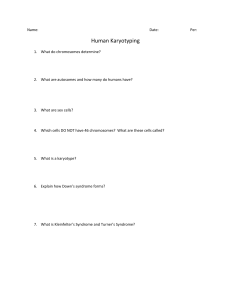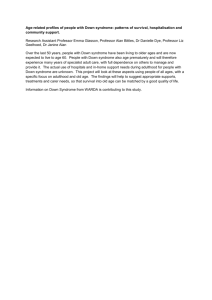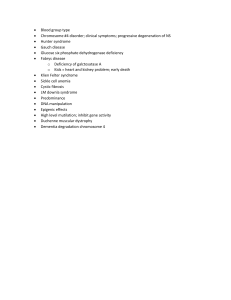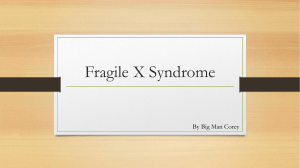cbsnews.com-What kind of society do you want to live in Inside the country where Down syndrome is disappearing
advertisement
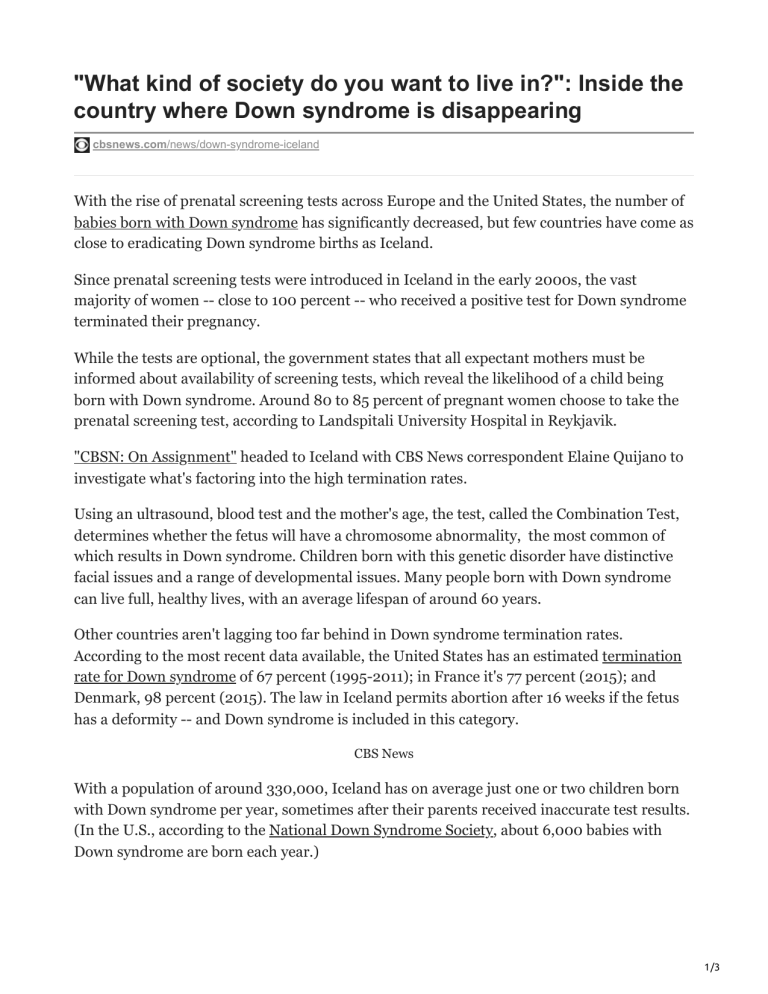
"What kind of society do you want to live in?": Inside the country where Down syndrome is disappearing cbsnews.com/news/down-syndrome-iceland With the rise of prenatal screening tests across Europe and the United States, the number of babies born with Down syndrome has significantly decreased, but few countries have come as close to eradicating Down syndrome births as Iceland. Since prenatal screening tests were introduced in Iceland in the early 2000s, the vast majority of women -- close to 100 percent -- who received a positive test for Down syndrome terminated their pregnancy. While the tests are optional, the government states that all expectant mothers must be informed about availability of screening tests, which reveal the likelihood of a child being born with Down syndrome. Around 80 to 85 percent of pregnant women choose to take the prenatal screening test, according to Landspitali University Hospital in Reykjavik. "CBSN: On Assignment" headed to Iceland with CBS News correspondent Elaine Quijano to investigate what's factoring into the high termination rates. Using an ultrasound, blood test and the mother's age, the test, called the Combination Test, determines whether the fetus will have a chromosome abnormality, the most common of which results in Down syndrome. Children born with this genetic disorder have distinctive facial issues and a range of developmental issues. Many people born with Down syndrome can live full, healthy lives, with an average lifespan of around 60 years. Other countries aren't lagging too far behind in Down syndrome termination rates. According to the most recent data available, the United States has an estimated termination rate for Down syndrome of 67 percent (1995-2011); in France it's 77 percent (2015); and Denmark, 98 percent (2015). The law in Iceland permits abortion after 16 weeks if the fetus has a deformity -- and Down syndrome is included in this category. CBS News With a population of around 330,000, Iceland has on average just one or two children born with Down syndrome per year, sometimes after their parents received inaccurate test results. (In the U.S., according to the National Down Syndrome Society, about 6,000 babies with Down syndrome are born each year.) 1/3 "Babies with Down syndrome are still being born in Iceland," said Hulda Hjartardottir, head of the Prenatal Diagnosis Unit at Landspitali University Hospital, where around 70 percent of Icelandic children are born. "Some of them were low risk in our screening test, so we didn't find them in our screening." When Thordis Ingadottir was pregnant with her third child at the age of 40, she took the screening test. The results showed her chances of having a child with Down syndrome were very slim, odds of 1 in 1,600. However, the screening test is only 85 percent accurate. That year, 2009, three babies were born with Down syndrome in Iceland, including Ingadottir's daughter Agusta, who is now 7. According to Ingadottir, three babies born with Down syndrome is "quite more than usual. Normally there are two, in the last few years." Since the birth of her daughter, Ingadottir has become an activist for the rights of people with Down syndrome. As Agusta grows up, "I will hope that she will be fully integrated on her own terms in this society. That's my dream," Ingadottir said. "Isn't that the basic needs of life? What kind of society do you want to live in?" Geneticist Kari Stefansson is the founder of deCODE Genetics, a company that has studied nearly the entire Icelandic population's genomes. He has a unique perspective on the advancement of medical technology. "My understanding is that we have basically eradicated, almost, Down syndrome from our society -- that there is hardly ever a child with Down syndrome in Iceland anymore," he said. Quijano asked Stefansson, "What does the 100 percent termination rate, you think, reflect about Icelandic society?" "It reflects a relatively heavy-handed genetic counseling," he said. "And I don't think that heavy-handed genetic counseling is desirable. … You're having impact on decisions that are not medical, in a way." Stefansson noted, "I don't think there's anything wrong with aspiring to have healthy children, but how far we should go in seeking those goals is a fairly complicated decision." According to Hjartardottir, "We try to do as neutral counseling as possible, but some people would say that just offering the test is pointing you towards a certain direction." Indeed, more than 4 out of 5 pregnant women in Iceland opt for the prenatal screening test. For expectant mother Bergthori Einarsdottir, who chose to have the test, knowing that most women did so helped steer her decision. "It was not pressure, but they told me that most women did it," she said. "It did affect me maybe a little bit." 2/3 Over at Landspitali University Hospital, Helga Sol Olafsdottir counsels women who have a pregnancy with a chromosomal abnormality. They speak to her when deciding whether to continue or end their pregnancies. Olafsdottir tells women who are wrestling with the decision or feelings of guilt: "This is your life — you have the right to choose how your life will look like." She showed Quijano a prayer card inscribed with the date and tiny footprints of a fetus that was terminated. Quijano noted, "In America, I think some people would be confused about people calling this 'our child,' saying a prayer or saying goodbye or having a priest come in -- because to them abortion is murder." Olafsdottir responded, "We don't look at abortion as a murder. We look at it as a thing that we ended. We ended a possible life that may have had a huge complication... preventing suffering for the child and for the family. And I think that is more right than seeing it as a murder -- that's so black and white. Life isn't black and white. Life is grey." 3/3
